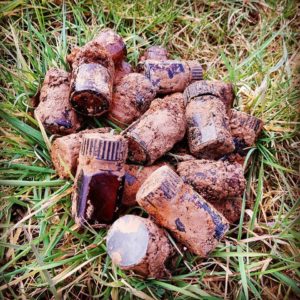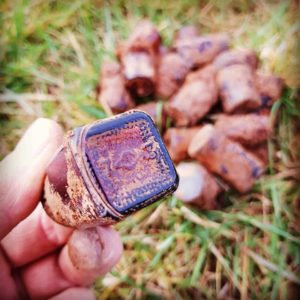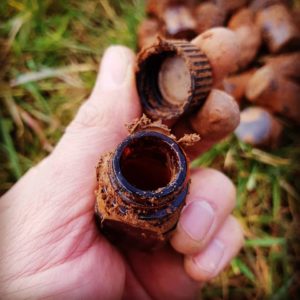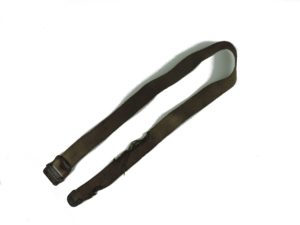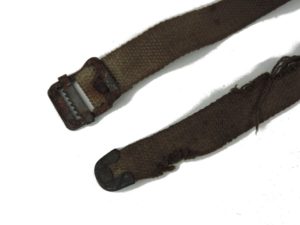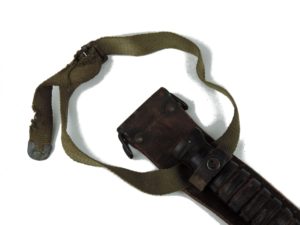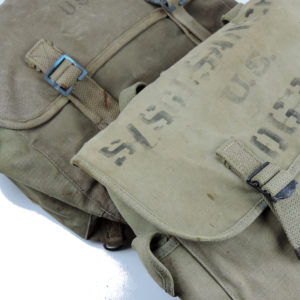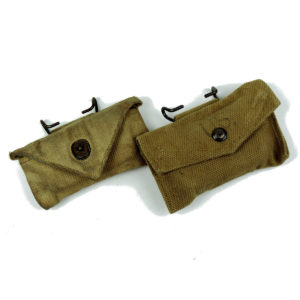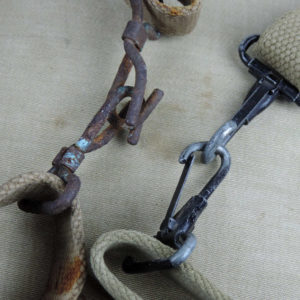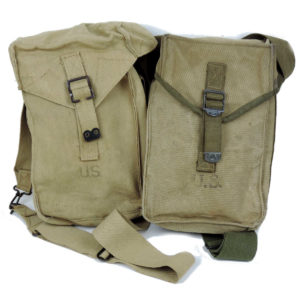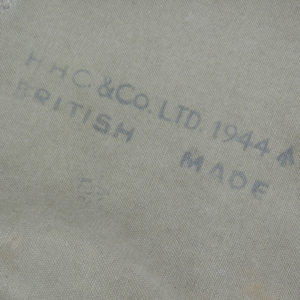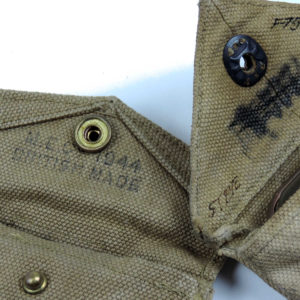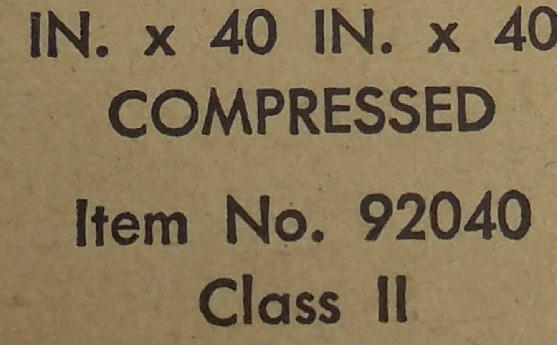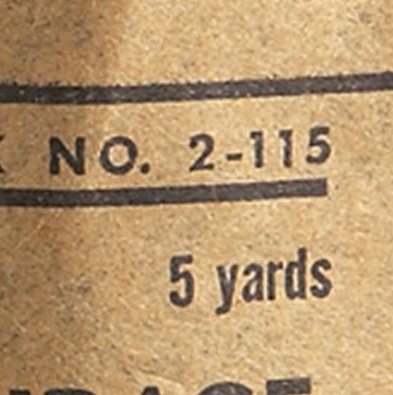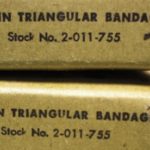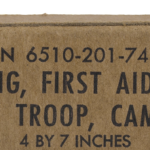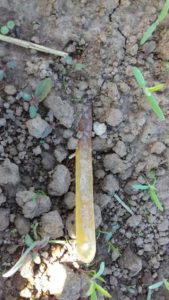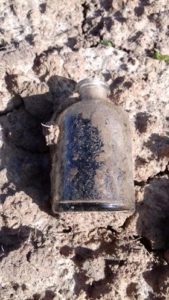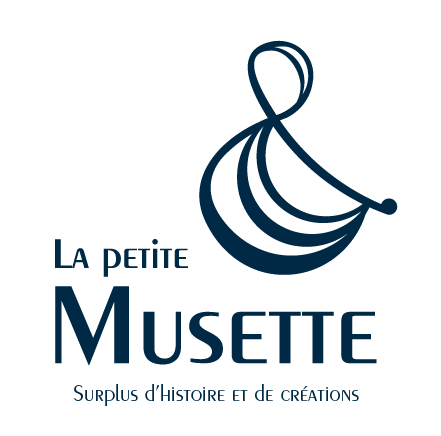by Bertrand Froger | 16 Mar 2018 | Collections, Historical events, Life of soldiers
Dog tagS,
various markings
We are often asked how the dog tags were struck at the time, then small turtoriel on the different strikes existing in time on the plate M1940. Attention, a soldier can be remap his own plates during his war so the typing pattern does not correspond to the date of engagement. To hit your own dog tags
https://boutique.lapetitemusette.com/fr/accueil/16-dog-tag-personnalise.html
December 1940 – November 1941
1st line: First name, first letter of 2nd name, last name
2nd line: Number, blood type
3rd line: First name and last name of the person to contact
4th line: Address of the contact person
5th line: City and state of the contact person

November 1941 – July 1943
(addition of tetanus and religion)
1st line: First name, first letter of 2nd name, last name
2nd line: number, tetanus vaccination, tetanus booster, blood group
3rd line: First name and last name of the person to contact
4th line: Address of the contact person
5th line: City and state of the contact person, religion

July 1943 – March1944
(withdrawal of the person to contact for fear of reprisals)
1st line: First name, first letter of 2nd name, last name
2nd line: number, tetanus vaccination, tetanus booster, blood group
3rd line:
4th line:
5th line: Religion

March 1944 – April1946
(Name and surname inversion)
1st line: Surname, first name
2nd line: number, tetanus vaccination, tetanus booster, blood group
3rd line:
4th line:
5th line: Religion

by Bertrand Froger | 12 Mar 2018 | Collections, Discoveries, Life of soldiers
Harvesting flasks
It was during a small Sunday walk through the plowing fields of the Carentan sector largely beaten by the rain for long weeks, that were collected on the ground about twenty small bottles of halazone. These small round-shaped or square (Owens-Illinois) brown-colored bottles, which may also be in a colorless version, with a white and / or blue label, were supplied to US Army cardboard soldiers or with rations. -in-1 because they were filled with tablets used to make the water clean for consumption. We often find these bottles with either a plastic stopper or metal, with an inside a piece of cotton.
by Bertrand Froger | 3 Mar 2018 | Anecdotes, Collections
A strap for paratrooper?
It is clear that in recent times many of these straps are sold with a name such as “portage strap 1st type for paratrooper”, it is necessary to restore certain truths. This white or green strap measures exactly 58 centimeters, with a loop at one end and an iron at the other. This type of strap is easily found on the foldable beds of the US Army and keep the folded bed during transport. Although some people no longer hesitate to rewrite the original nomenclature of the US equipment for their benefit, this strap is therefore in no way a paratrooper strap at the base.
Still used by paratroopers
However, it is not uncommon to see paratroopers ready to embark for Normandy on the British aerodromes that actually carry this kind of straps, as well as many other models of recovery straps. These straps, one like the other, allow them to fix certain equipment, including ankles, such as Hawkins mines, US M3 daggers in their sheath, etc … This anecdotal use does not justify the name of any “parachute strap”. It is only, as in many other cases, rare objects diverted from their original use by US Army soldiers in the theater of operations.
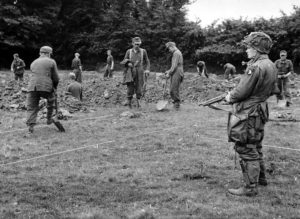
by Bertrand Froger | 20 Feb 2018 | Collections
History…
Before the Normandy landings and the beginning of the operations in Europe, the US army has already settled in Britain for several years and has turned the territory into a true advanced base. To meet the needs of military equipment, it faces import problems from the United States because of the blockade led by German submarines: the dreaded U-Boots. However, it must respond to this request. As a result, contracts are made with local businesses. This production of US material under British contract bears a name: the British Made.
Technic…
Highly prized collectors, the material “British Made” has some peculiarities distinguishing it from the traditional “Made in USA”. The canvas, often thicker (Web), very specific loops, round pressures, … are all points that are different on this equipment. Finally, this material in general carries the mention “British Made” confirming its manufacture on the British territory, often during the years of war: 1943, 1944, 1945. Among the photos, some accessories are posted by way of comparison (Musette M- 1936, Musette GP Ammo Bag, First Aid Pouch).
(Credits photos : Collection Bertrand Froger)
by Bertrand Froger | 3 Aug 2017 | Collections, Discoveries
Items from WWII era…
It is clear that many medical effects are marketed without determining the right time of manufacture. So, you will find some tricks not to get you hurt. From 1941 to March 1944, all the items are followed by 5 digits (ex: 23080). However, during the year 1943, a new 7-digit numbering was created (ex: 23080 becomes 2308000). The first digit corresponds to the class (previously detached from the item number), the second digit to use, the next three to the item code and the last two to the variant. There is also a 4-digit numbering beginning with “2-” (type 2-308) corresponding to the US Navy over the period 1941-1946. At this point there is talk of “Stock” instead of ” item “.
…but also items from after WWII era.
Even if some effects are produced immediately after the war with the same codes as those discovered previously, a new numbering appears as early as 1947 in the form of several numbers separated by dashes. (Example: 2-308-000) until 1950. After this date, all item numbers of this type will be preceded by F.S.N. And this to the present day. To put it simply, beware of FSN mentions and numbers composed of several dashes. At least, as far as the Second World War is concerned. These effects can interest the enthusiasts of other conflicts (Vietnam, …).
by Bertrand Froger | 22 May 2017 | Collections, Discoveries, Life of soldiers
Remains of the Battle on the ground
Small Sunday walk in Normandy and we still find some small trash dragging on the ground. The bottle contained penicillin while the complete toothbrush is a Park Avenue model from Dupont, made in USA! 73 years later, the traces of the conflict are still omnipresent. Our beaches, plowshares and pastures were the scene of the greatest military operation of all time, requiring extraordinary means. Millions of men and women have crossed Europe and the world to come and repel the German invaders. Thus, many small objects of everyday life were thrown in the corner of hedges or lost during an assault. These are still beautiful witnesses.







